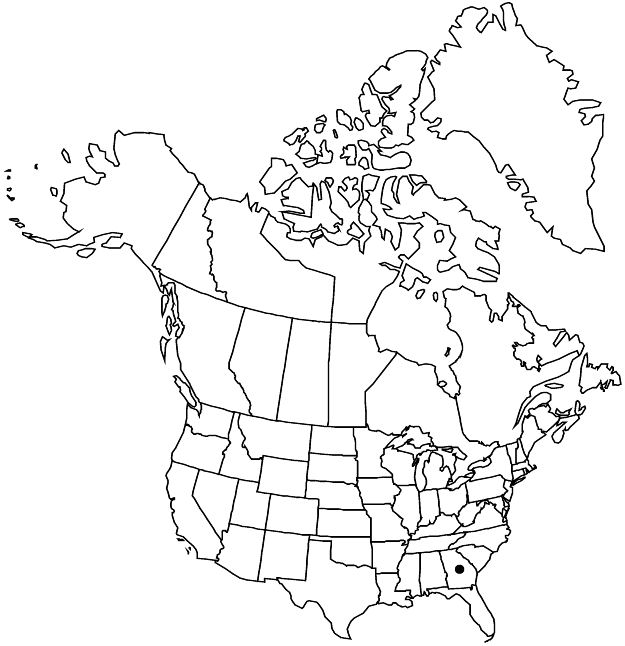Euphorbia georgiana
J. Bot. Res. Inst. Texas 7: 639, fig. 2[row 2, left]. 2013.
Herbs, annual, with taproot. Stems erect, often branched near base, 10–18 cm, glabrous. Leaves: petiole absent; blade oblanceolate, 5–12 × 3–5 mm, base attenuate, margins entire, apex rounded, surfaces glabrous; venation pinnate, midvein prominent. Cyathial arrangement: terminal pleiochasial branches 3, 1–3 times 2-branched; pleiochasial bracts rotund-obovate, wider than distal leaves; dichasial bracts distinct, not imbricate, broadly deltate to subreniform, base truncate to emarginate, margins entire, apex rounded to bluntly acuminate; axillary cymose branches 0–1. Cyathia: peduncle 0.3–0.5 mm. Involucre infundibular, 1–1.1 × 0.4–0.5 mm, glabrous; glands 4, crescent-shaped; 0.3–0.4 × 0.4–0.5 mm; horns divergent, 0.3–0.5 mm. Staminate flowers 5–10. Pistillate flowers: ovary glabrous; styles 0.5 mm, 2-fid. Capsules depressed-ovoid, 2.2–2.4 × 3.2–3.4 mm, 3-lobed; cocci rounded, smooth, glabrous; columella 2–2.1 mm. Seeds gray, ovoid, 1.6–1.7 × 1.4–1.6 mm, with deep, rounded pits irregularly scattered over entire surface; caruncle reniform, subconic, 0.5–0.6 × 0.6–0.8 mm.
Phenology: Flowering and fruiting spring.
Habitat: Granite outcrops.
Elevation: 100–200 m.
Discussion
Euphorbia georgiana is restricted to granitic outcrops; it is known from Oglethorpe and Wilkes counties (M. H. Mayfield 2013). It is similar to E. austrotexana but has larger seeds that are much more deeply pitted and leaves that are oblanceolate instead of linear-oblanceolate to linear. It is also quite distinct from the more robust, biennial or occasionally annual E. commutata, the only other closely-related species that occurs in the area.
Selected References
None.
